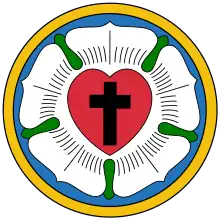Aster Ganno
Aster Ganno (c.1872–1964) was an Ethiopian Bible translator who worked with the better known Onesimos Nesib as a translator of the Oromo Bible, published in 1899.
| Part of a series on |
| Lutheranism |
|---|
 |
She was born free, but was later enslaved by the king of Limmu-Ennarea. She was emancipated in 1886 when Italian ships intercepted a boat which was taking her to be sold on the Arabian Peninsula, then took her to Eritrea where the Imkullu school of the Swedish Evangelical Mission took her in. Aster (by Ethiopian custom, she is referred to by her first name) was educated at their school. Onesimos quickly “discovered that Aster was endowed with considerable mental gifts and possessed a real feeling for the Oromo language” (Arén 1978:383). She was assigned to compile an Oromo dictionary, which was first used in polishing a translation of New Testament published in 1893.
Aster also translated a book of Bible stories and wrote down 500 traditional Oromo riddles, fables, proverbs, and songs, many of which were published in a volume for beginning readers (1894). She later worked with Onesimos in compiling an Oromo hymnbook. Arén reports that a large amount of folklore she collected is still unpublished, preserved by the Hylander family (Arén 1978:384, fn. 71).
Aster and Onesimos completed translating the complete Bible into Oromo, which was printed in 1899. The title page and history credit Onesimos as the translator, but it appears that Aster's contribution was not, and still is not, adequately appreciated.[1]
In 1904, Aster, together with Onesimos and other Oromos, were able to move from Eritrea back to Wellega, where they established schools, Aster serving as a teacher at Nekemte.
References
- Arén, Gustav (1978). Evangelical Pioneers in Ethiopia. Stockholm: Stockholm: EFS Forlaget.
- Kebbede Hordofa Janko and Unseth, Peter (2003). "Aster Ganno". Encyclopaedia Aethiopica, vol. 1, edited by Siegbert Uhlig, pp. 387,388. Wiesbaden: Harrassowitz.
Citated references
- Senai Wolde Andemariam. 2013. Who should take the credit for the Bible translation works carried out in Eritrea? Aethiopica 16: 102-129. Online access to article
External links
- Mekuria Bulcha, "Onesimos Nasib's Pioneering Contributions to Oromo Writing", Nordic Journal of African Studies 4(1): 36-59 (1995)
- Dirshaye Menberu, "Onesimus Nesib", Dictionary of African Christian Bibliography